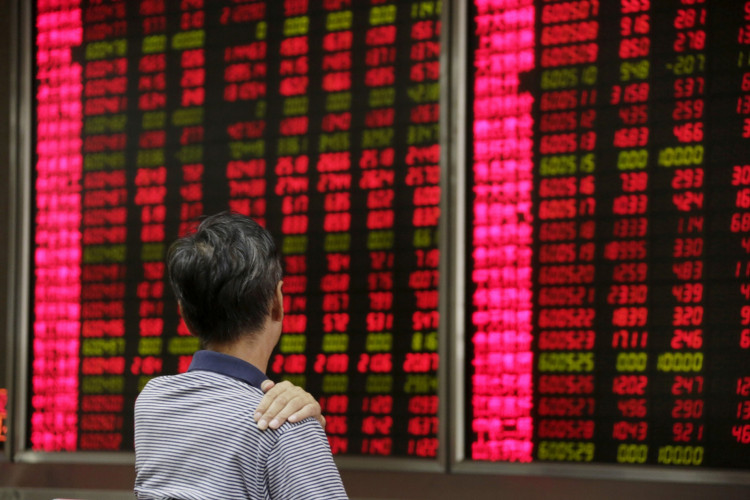Chinese markets experienced a dramatic rise and fall on Tuesday as investors reacted to signals from Beijing about future economic stimulus. The initial optimism following the country's Golden Week holiday gave way to disappointment after China's National Development and Reform Commission failed to deliver concrete details on new stimulus measures. The mixed messaging sent shockwaves through global markets, with Hong Kong's Hang Seng index suffering its worst single-day loss since 2008.
At the open, the CSI 300, a benchmark for the largest mainland Chinese stocks, soared over 10% before cooling off to close 5.93% higher at 4,256.1. Meanwhile, the Shanghai Composite Index posted a 4.6% gain. Despite the robust start, investor enthusiasm quickly waned, underscoring the market's sensitivity to economic signals from Beijing.
Hong Kong's Hang Seng index bore the brunt of market uncertainty, plunging over 10% before clawing back some losses to end the session down 9.4%. The decline marked its steepest drop since the financial crisis of 2008, a stark contrast to the recent rally that had positioned it as one of the best-performing markets globally.
The rollercoaster session was set in motion after Zheng Shanjie, chairman of China's National Development and Reform Commission, offered reassurances that the government was "fully confident" in reaching its economic targets for 2024. He announced plans to advance 200 billion yuan from next year's budget to fund infrastructure projects and bolster local governments. However, the lack of detailed and substantial measures led investors to question the depth of Beijing's commitment to stimulating the economy.
Vasu Menon, managing director of investment strategy at OCBC in Singapore, commented, "Ultimately for the rally to be sustainable, we need to see more fiscal policy and more measures to support the economy and the property market. A great deal of hope has been built into the strong rally in recent weeks, and we now need to see additional government policy action to support the uptrend."
The hesitation in Beijing's policy response has prompted a global ripple effect, affecting China-exposed assets worldwide. The Australian dollar dropped 0.5%, while the yuan faced its sharpest decline in ten months. Commodities were not spared either, with iron ore prices slumping 5% and London copper hitting its lowest level in a week. Major global miners like Rio Tinto and BHP saw their shares fall in response to the market turmoil.
Investor enthusiasm prior to the Golden Week holiday was fueled by China's aggressive economic stimulus measures, which drove the CSI 300 to gain 25% over five sessions. But as markets reopened, profit-taking was evident, alongside a rush of new money flowing into exchange-traded funds (ETFs) and sectors expected to benefit from any forthcoming government support.
Wen Hao, an experienced investor from Hangzhou, described the market activity as a combination of "massive profit taking as well as fresh money inflow," noting that small-cap stocks often outperform during the early stages of a bull market. "It's still early in the bull market, and a good time to buy stocks," he advised, highlighting technology hardware makers, brokers, and healthcare companies as potential winners.
While the broader Chinese markets showed resilience, Hong Kong's real estate sector was hit hard. Mainland property developers saw a historic one-day drop of 15.5%, driven largely by profit-taking and realignment of funds towards mainland Chinese markets. Analysts suggested this movement reflected a strategic shift, with investors favoring areas where government interventions might have a more direct impact.
"The returns between Hong Kong and Chinese stocks remain largely parallel," said Sean Teo, a sales trader at Saxo in Singapore. "This underperformance may be due to some investors reallocating their funds from Hong Kong to Chinese markets, where government stimulus is more direct."
Elsewhere in Asia, market sentiment was also muted. Japan's Nikkei 225 fell 1% to close at 38,937.54 following weaker-than-expected household spending data, while the Topix declined 1.47%. South Korea's Kospi dipped 0.61%, influenced by a disappointing earnings forecast from Samsung Electronics, a key player in the region's tech sector.
In the U.S., stocks also struggled as rising oil prices and higher Treasury yields weighed on market sentiment. The Dow Jones Industrial Average dropped 0.94%, while the S&P 500 fell 0.96%, and the Nasdaq Composite slipped 1.18%. The benchmark 10-year Treasury yield rose to 4.02%, its highest level since August, adding to the pressure on equities.






